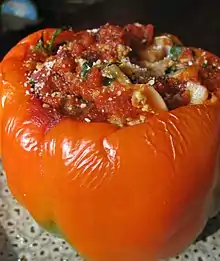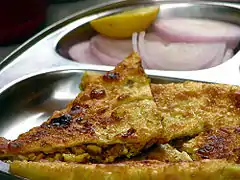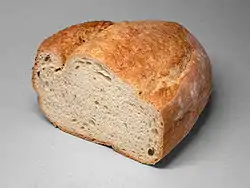Stuffing
Stuffing, filling, or dressing is an edible mixture, often composed of herbs and a starch such as bread, used to fill a cavity in the preparation of another food item. Many foods may be stuffed, including poultry, seafood, and vegetables. As a cooking technique stuffing helps retain moisture, while the mixture itself serves to augment and absorb flavors during its preparation.
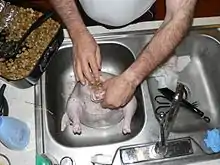
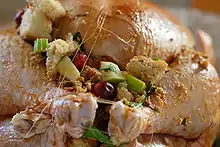
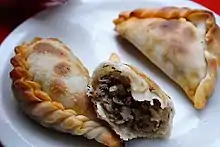
Poultry stuffing often consists of breadcrumbs, onion, celery, spices, and herbs such as sage, combined with the giblets.[1] Additions in the United Kingdom include dried fruits and nuts (such as apricots and flaked almonds),[2][3][4] and chestnuts.[5][6]
History
.JPG.webp)
It is not known when stuffings were first used. The earliest documentary evidence is the Roman cookbook, Apicius De Re Coquinaria, which contains recipes for stuffed chicken, dormouse, hare, and pig. Most of the stuffings described consist of vegetables, herbs and spices, nuts, and spelt (an old cereal), and frequently contain chopped liver, brains, and other organ meat.[7]
Names for stuffing include "farce" (~1390), "stuffing" (1538), "forcemeat" (1688), and relatively more recently in the United States; "dressing" (1850).[8][9]
Cavities
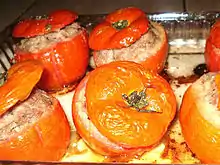
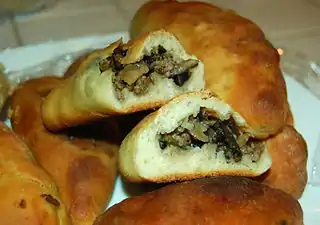
In addition to stuffing the body cavity of animals, including birds, fish, and mammals, various cuts of meat may be stuffed after they have been deboned or a pouch has been cut into them. Recipes include stuffed chicken legs,[10] stuffed pork chops,[11] stuffed breast of veal,[12] as well as the traditional holiday stuffed turkey or goose.
Many types of vegetables are also suitable for stuffing, after their seeds or flesh has been removed. Tomatoes, capsicums (sweet or hot peppers), vegetable marrows (e.g., zucchini) may be prepared in this way. Cabbages and similar vegetables can also be stuffed or wrapped around a filling. They are usually blanched first, in order to make their leaves more pliable. Then, the interior may be replaced by stuffing, or small amounts of stuffing may be inserted between the individual leaves.[13]
Purportedly ancient Roman, or else Medieval, cooks developed engastration recipes, stuffing animals with other animals. An anonymous Andalusian cookbook from the 13th century includes a recipe for a ram stuffed with small birds. A similar recipe for a camel stuffed with sheep stuffed with bustards stuffed with carp stuffed with eggs is mentioned in T.C. Boyle's book Water Music.[14] Multi-bird-stuffed dishes such as the turducken or gooducken are contemporary variations.
Fillers
Almost anything can serve as a stuffing. Many Anglo-American stuffings contain bread or cereals, usually together with vegetables, herbs and spices, and eggs. Middle Eastern vegetable stuffings may be based on seasoned rice, on minced meat, or a combination thereof. Other stuffings may contain only vegetables and herbs. Some types of stuffing contain sausage meat, or forcemeat, while vegetarian stuffings sometimes contain tofu. Roast pork is often accompanied by sage and onion stuffing in England; roast poultry in a Christmas dinner may be stuffed with sweet chestnuts. Oysters are used in one[15] traditional stuffing for Thanksgiving. These may also be combined with mashed potatoes, for a heavy stuffing. Fruits and dried fruits can be added to stuffing including apples, apricots, dried prunes, and raisins. In England, a stuffing is sometimes made of minced pork shoulder seasoned with various ingredients, sage, onion, bread, chestnuts, dried apricots, dried cranberries etc.[5] The stuffing mixture may be cooked separately and served as a side dish. This may still be called stuffing or it may be called dressing.[16]
Food safety
The United States Department of Agriculture (USDA) states that cooking animals with a body cavity filled with stuffing can present potential food safety issues. These can occur because when the meat reaches a safe temperature, the stuffing inside can still harbor bacteria (and if the meat is cooked until the stuffing reaches a safe temperature, the meat may be overcooked). For turkeys, for instance, the USDA recommends cooking stuffing separately from the bird and not buying pre-stuffed birds.[17]
See also
- Breadcrumb
- Breading
- Forcemeat
- Kousa Mahshi, squash or zucchini stuffed with rice and meat
- List of stuffed dishes
- List of bread dishes
- Panada
- Paxo
- Sarma and Dolma, stuffed vegetables in the tradition of Ottoman cuisine
- Stove Top stuffing
- Stuffed pepper
References
| Look up stuffing in Wiktionary, the free dictionary. |
- "Traditional Roast Chicken with Apple, Sage and Onion Stuffing, Cranberry and Sage Sauce and Chicken-giblet Gravy - English - Recipes - from Delia Online". Deliaonline.com. 9 November 2015. Retrieved 2 December 2015.
- "Apricot & hazelnut stuffing". BBC Good Food. 24 July 2015. Retrieved 2 December 2015.
- "Apricot sausagemeat stuffing". BBC Good Food. 2 January 2011. Retrieved 2 December 2015.
- "Hairy Bikers' Christmas turkey with two stuffings recipe". Goodtoknow. Retrieved 2 December 2015.
- "Fail-Safe Pork & Sage Stuffing | Jamie Oliver". 27 November 2015. Retrieved 2 December 2015 – via YouTube.
- "Rustic chestnut stuffing". BBC Good Food. 24 July 2015. Retrieved 2 December 2015.
- "Stuffing – Food Facts & History". FoodReference.com.
- Oxford English Dictionary.
- "Stuffing or dressing?". Marthaandtom. 22 November 2009. Retrieved 2 December 2015.
- C (24 July 2015). "Chicken ballottines with sage & pancetta". BBC Good Food. Retrieved 2 December 2015.
- "Stuffed Pork Chops Recipe". Food Network. 21 October 2003. Retrieved 2 December 2015.
- "Stuffed Braised Veal Breast Recipe : Anne Burrell". Food Network. 3 October 2011. Retrieved 2 December 2015.
- Olia Hercules (17 May 2015). "Eight delicious, rich and nourishing recipes from Ukraine and beyond | Life and style". The Guardian. Retrieved 2 December 2015.
- "Konundrum Engine Literary Review - TC Boyle Interview". Lit.konundrum.com. Retrieved 2 December 2015.
- "Oyster Dressing Recipe : Paula Deen". Food Network. 8 October 2011. Retrieved 2 December 2015.
- Turkey day turmoil: Is it stuffing or dressing? Archived 28 November 2015 at the Wayback Machine
- "Turkey Basics: Stuffing". USDA Factsheets. Archived from the original on 9 November 2008.
